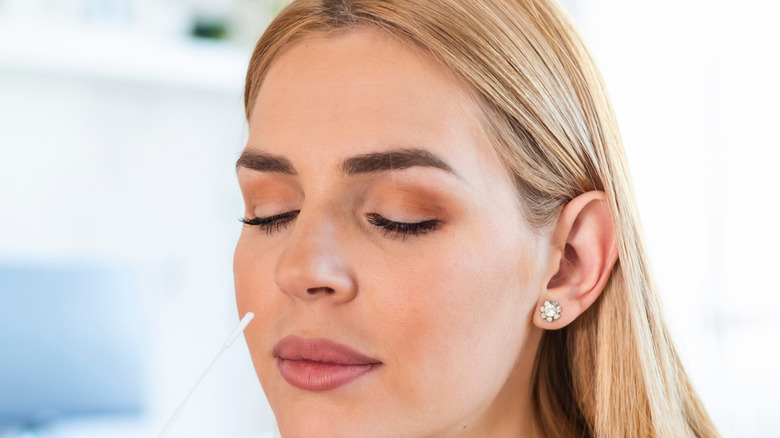A New At-Home Test Can Detect More Than Just COVID-19
If you develop a fever, fatigue, and body aches, your first thought is probably now COVID-19. In the past couple of years, when COVID has largely dominated thoughts and headlines, it's easy to forget that it is just one of several respiratory viruses circulating among us. What if you have the flu, or even respiratory syncytial virus (RSV)? Well, now there's a test that could help identify exactly what's ailing you.
In September 2020, global life sciences company Labcorp announced the launch of the first test that can test for COVID-19, influenza A and B, and RSV through a single nasal swab (via Labcorp). The U.S. Food and Drug Administration (FDA) subsequently granted Labcorp emergency use authorization (EUA) for the test on May 16, 2022, making it the first test of its kind to be available to consumers without a doctor's prescription. "This is the first test authorized for flu and RSV, along with COVID-19, where an individual can self-identify their need for a test, order it, collect their sample and send it to the lab for testing, without consulting a healthcare professional," Jeff Shuren, director of FDA's Center for Devices and Radiological Health, said in a statement (via Bloomberg). Since the four viruses being tested for can all produce similar symptoms, this can give patients a simple tool to identify exactly which one they're carrying.
Labcorp's test includes an easy nasal swab
Despite the benefits of the test, there are some drawbacks. Labcorp's test kits currently retail for $169, and it is unknown whether insurers will cover some or all of the cost (via Healthline). Furthermore, the test doesn't cover all respiratory viruses that could be circulating. This means that a negative test doesn't necessarily mean you're not infected or contagious.
Not only that, but since treatments for mild to moderate COVID-19, flu, and RSV are similar, some question whether it's worth it for low-risk individuals to bother with a test to distinguish between them. "There is a big cost difference between the single COVID-19 test and the combination test," Dr. Anna Van Tuyl, the director of the Division of Critical Care at Staten Island University Hospital's Department of Emergency Medicine, told Healthline. "It may not be worth the extra cost just to know you do or do not have the other viral illnesses."


